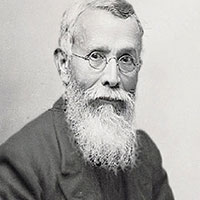Surendranath Banerjee
Sir Surendranath Banerjee was one of the earliest Indian political leaders during the British Rule. He founded a nationalist organization called the Indian National Association, through which he led two sessions of the Indian National Conference in 1883 and 1885, along with Anandamohan Bose.
Sir Surendranath Banerjea, , one of the founders of modern India and a proponent of autonomy within the British Commonwealth.
Banerjea was born into a distinguished family of Brahmans. After graduation from college, he applied in England for admission to the Indian Civil Service, which at that time had only one Hindu. Banerjea was rejected on the grounds that he had misrepresented his age. Charging racial discrimination, he won his appeal by arguing that he calculated his age according to the Hindu custom of reckoning age from the date of conception rather than from birth. He was appointed to Sylhet (now in Bangladesh) but was dismissed in 1874, in the midst of controversy and protests, following charges of procedural irregularities.
In a teaching career for the next 37 years, Banerjea founded Ripon College, later renamed for him, in Calcutta (Kolkata), and developed his ideas on nationalism. In 1876 he helped found the Indian Association to bring Hindus and Muslims together for political action. Three years later he purchased The Bengalee, a newspaper he edited for 40 years from his nationalist viewpoint.
An effective speaker at the annual sessions of the Indian National Congress, which first met in 1885, he was twice elected its president in the years before the moderate-extremist split of 1917.
In London in 1909 Banerjea appealed to the British to modify the 1905 partition of Bengal, reinstitute habeas corpus, and grant India a constitution on the Canadian model. He believed firmly in representative government and constitutional progress by constitutional means. He advised Indians to “agitate, agitate, agitate—you have yet to learn the great art of grumbling,” but he opposed the extreme methods advocated by the political leader B.G. Tilak and some of the noncooperation tactics that were practiced by Mahatma Gandhi.
Elected in 1913 to both the Bengal and imperial legislative councils, Banerjea welcomed the principles of the Montagu-Chelmsford report of 1918, which recognized self-government as the goal of British policy in India. In 1921 he was knighted and accepted office as minister of local self-government in Bengal. Attacked by extreme nationalists as a turncoat, he was defeated in the 1924 dyarchy elections by a Swaraj (independence) candidate, whereupon he retired to write his autobiography, A Nation in Making (1925)

Surendranath Banerjee
Date of Birth: 10 Nov 1848
Birth Place: Kolkata
Proffession: Political leader
Nationality: India
Death: 6 August 1925, Barrackpore


